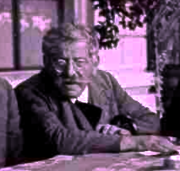by
Heike Bauer

This post was originally published on A Violent World of Difference
Why turn to Magnus Hirschfeld (1868-1935) to re-examine the difficult aspects of modern queer history and culture?

Hirschfeld is a well known figure, especially in the German history and historiography of sexuality, and he continues to inspire a number of German sexual reform organisations. My own reasons for turning to his work are, however, emphatically not about recuperating him as a ‘role model’ for queer activism. Like others, Hirschfeld was not free of the prejudice of his time. While his achievements should not be diminished, I think it is equally vital to pay attention to the norms that underpinned his thinking. For if we want to understand how prejudice is perpetuated and how norms work themselves into basic assumptions about what it means to be human, then we need histories that are attentive to the often paradox and difficult aspects of the queer past.
My project examines how violence, death and suicide shaped modern queer culture. Hirschfeld is of interest to me because his many activities place him at the centre of modern sexual politics. He was a sexologist and homosexual rights activist who, in 1919, founded the world’s first Institute for Sexual Sciences in Berlin. He is best known today for his concept of ‘sexual intermediaries’ (sexuelle Zwischenstufen), the idea that there exist infinite variations in gender and sexuality, and for his campaigning for the abolition of Paragraph 175 of the German Penal Code, which criminalised homosexuality. Hirschfeld is also remembered as one of the first transgender theorists. At the same time, however, like so many of his contemporaries, he promoted eugenics, pursuing the problematic belief that humans could be ‘improved’ via carefully managed reproduction, a belief that seems to jar with his equality activism and anti-racist politics.
 Hirschfeld’s political activism, his Jewishness and homosexuality made him a target for rightwing attacks from the 1920s onward. In May 1933, while he was in exile, the Nazis destroyed his Institute and burnt many of its books in the first of the infamous book burnings.
Hirschfeld’s political activism, his Jewishness and homosexuality made him a target for rightwing attacks from the 1920s onward. In May 1933, while he was in exile, the Nazis destroyed his Institute and burnt many of its books in the first of the infamous book burnings.
While Hirschfeld’s activities were shaped by the German contexts in which he mainly worked, he also forged many international connections. I am particularly interested in his hitherto under-examined contributions to British and U.S. culture. Hirschfeld not only travelled regularly to the States, where he gave popular lectures, but he also collaborated with, for example, English sexologist Havelock Ellis, wrote about writers such as Oscar Wilde and himself entered literary history via the work and private papers of figures such as W.H. Auden and Christopher Isherwood.
While Hirschfeld’s main influence was in the male scientific and artistic circles of his time, he also collaborated with leading feminists such as Helene Stoecker, with whom he worked at the Institute, and the writer Franziska Mann, Hirschfeld’s sister with whom he wrote a pamphlet about women’s suffrage. These collaborations offer new insights into the – often problematic – intersecting histories of feminist and gay politics.
Hirschfeld’s work, then, provides insights into the role of sexology in the international literary and political reform cultures of the early twentieth century and it helps us understand better the transnational contexts that shaped modern sexuality debates. Most of all, however, his writings contain an archive of little known writings on verbal and physical attacks on homosexuals, writings that document the range of difficult experiences that shaped modern queer life. Over the course of the project, I will research, collate and critique this material – and publish my findings here and, ultimately, in book form.

Heike Bauer is a Senior Lecturer in English and Gender Studies at Birkbeck College, University of London. Her research focuses on the history of sexuality since 1800, especially sexology, translation and cross-cultural exchange, nineteenth and early twentieth century literature and culture, and queer history. Follow Heike on Twitter @Heike_Bauer or visit her website: A Violent World of Difference

